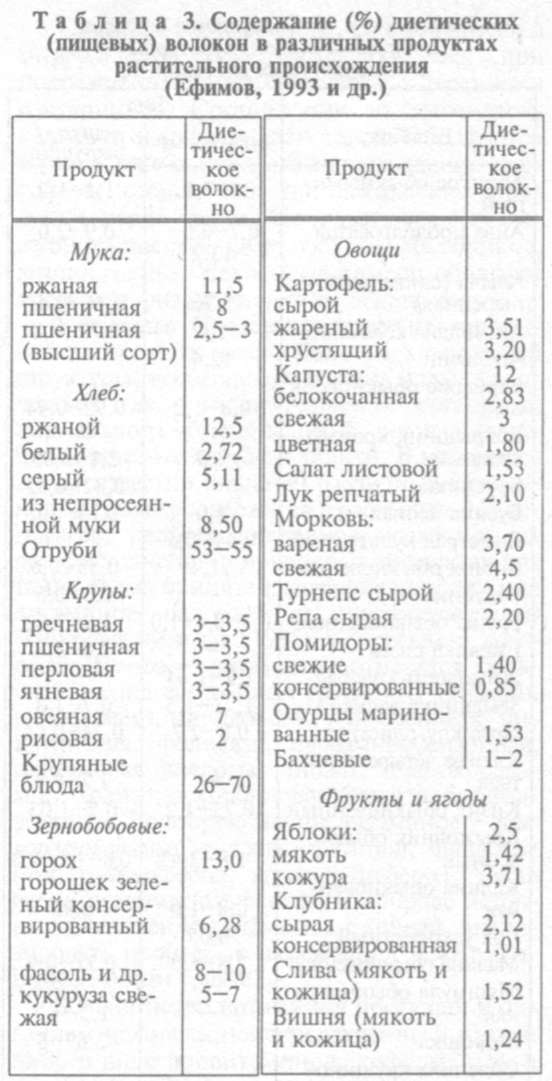Alimentary fiber
The various products of vegetable origin dietary fiber content and ratio vary. The main sources of dietary fiber - wild plants, bread, cereals, vegetables, beans, melons, herbs, fruits and berries. A lot of them in flour, meal - 100 g rye flour - 11,5%, wheat - 8, white flour - 2.5-3%.
The bread grain 90% of the fibers are in its shell (bran), which contains 1/4 of the entire protein, lots of vitamins and minerals. Therefore, we recommend a daily consumption of gray wheat and rye bread, and bread made from rye flour and wholemeal cereal rye grain.
The relatively large number of different dietary fiber Peas - 13%, beans and other legumes - 8-10, cereals - buckwheat, wheat, barley, barley - 3-3.5, oat - 7 Figure - 2, many vegetables - carrots, beets and others, melons -. 1-2%, fruits and berries - pear, white currant and red raspberry - 0.3-0.7%.

Dietary fiber promote normal functioning of the digestive system, stimulate the secretion of digestive juices, increase bile secretion and motility, accelerating the advancement of the masses of food through the intestines, prevent the occurrence of chronic constipation. They reduce intestinal mucosal contact with various toxic substances ingested with food (pesticides, compounds of mercury, lead, cadmium, arsenic, radioactive elements, nitrates, etc.), Formed in the large intestine under the influence of the microflora, decomposition products of bile acid, cholesterol, amino acids .
Dietary fiber can effectively bind these compounds, including calcium, magnesium, iron, zinc, reducing their digestibility, excrete. Their use of the microflora as a source of power, they determine its species composition, which is reflected in the formation of the intensity in the colon carcinogens.
Lack of fiber in the diet is a risk factor for many serious diseases, such as atherosclerosis, diabetes, hypertension, obesity, gallstone disease, ulcerative colitis, colon cancer and other diseases.
Lacto-vegetarian food provides a relatively high level of dietary fiber intake and the maintenance of normal intestinal microflora. It is recommended to include in the diet 40% of dietary fiber from grain products, 51 - from vegetables, 9% - from fruits and berries.
The need for adult in dietary fiber is approximately 20-25 grams per day, people with excess weight - '30 Excessive amounts of fiber in the diet overloads the activity of the digestive system, lowers the digestibility of proteins, fats, minerals (especially calcium, magnesium, zinc) and vitamins.
Enveloped cereal grains (rye, wheat) are a natural dietary fiber enterosorbent connecting and deducing from an organism radionuclides and toxins. They activate intestinal peristalsis and excretion of bile acids, reducing body weight, are recommended for the treatment of radioactive contamination of the body, atherosclerosis, coronary heart disease, diabetes, chronic cholecystitis, constipation, obesity, and food poisoning.


Comments
Commenting, keep in mind that the content and the tone of your messages can hurt the feelings of real people, show respect and tolerance to his interlocutors, even if you do not share their opinion, your behavior in terms of freedom of speech and anonymity offered by the Internet, is changing not only virtual, but real world. All comments are hidden from the index, spam control.